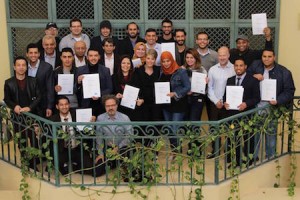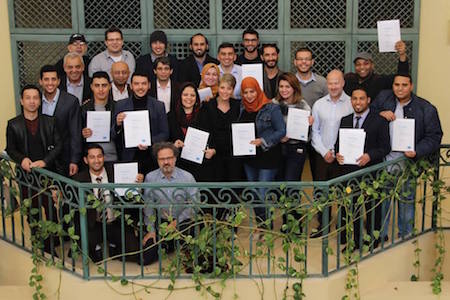By Adam Ali and Mosbah Ahmed.

Tunis, 23 March 2015:
Deutsche Welle (DW) Akademie recently ran a 12-day workshop in Tunis for Libyan . . .[restrict]journalists, aimed at developing journalists to report impartially on events in Libya and at developing all sectors of Libyan media. The event was attended by Nataliya Apostolova, the European Union ambassador to Libya, members of Libya’s Constitutional Drafting Assembly and human rights activists.
DW Akademie launched its Stability through Structure programme in Libya last year. The €3 million project aims at the “consolidation of the state of democratic reform and institution building in Libya by supporting the emergence of a free high-quality press and media, and thereby enhancing the context for political development in particular through the constitutional process” said the EU.
The project is composed of four clusters, namely: media governance and regulatory framework, public media transition scheme, journalism independence initiative and Libyan content development fund. This last was a two-year grant project by the European Union Delegation to Libya undertaken by IWPR in partnership with DW Akademie .
Originally, training took place inside Libya, but since fighting began in the capital last summer, DW Akademie has had to conduct workshops outside, in Tunis and Istanbul. Rather than focus on Libyan media outlets they have shifted their focus to individual journalists.
Another key component of the Stability through Structure programme -the Cloud News Agency (CNA)—is set to launch this summer. According to DW, by April some 100 Libyan media workers will have been trained to provide independent and impartial coverage of events in Libya, uploading reports to CNA for publication.
Project manager Khaeri AbuShagor told the Libya Herald that over the past seven months DW Akademie has been laying the groundwork for CNA’s launch.
According to AbuShagor, DW’s main focus in the immediate aftermath of the revolution was on institutions rather than individuals. They began in 2011 working with newspapers, magazines and some radio stations, choosing personnel from various media outlets to train.
When the EU decided to launch the €3 million project in Libya to build the capacity of Libya’s media outlets, they chose DW to run it because of its previous Libyan experience and the relationships it had developed within the media.
When Tripoli came under attack by Libya Dawn forces in July 2014, DW personnel were ordered to evacuate the country. Shortly afterwards, many media outlets came under control of various sides of the conflict or were forced to close down.
“Though we originally planned to work with media outlets in Libya, difficulties arose that forced us to deal directly with journalists,” said AbuShagor.
Access to Cloud News Agency will be available by subscription when it goes online this summer.
[/restrict]










